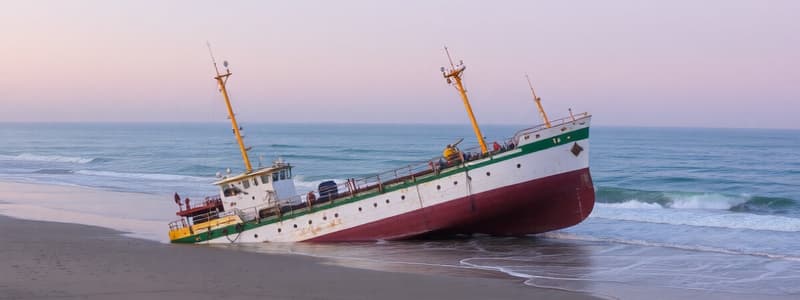Podcast
Questions and Answers
What is the term for when a ship's grounding is accidental or unintentional?
What is the term for when a ship's grounding is accidental or unintentional?
- Beaching
- Stranding (correct)
- Docking
- Anchoring
Beaching refers to an accidental grounding of a vessel.
Beaching refers to an accidental grounding of a vessel.
False (B)
Navigation errors, steering failure, and lack of experience can lead to a ship's _________.
Navigation errors, steering failure, and lack of experience can lead to a ship's _________.
stranding
Which part of the ship can potentially cause a stranding?
Which part of the ship can potentially cause a stranding?
The ship's double bottom area is immune to damage during a stranding.
The ship's double bottom area is immune to damage during a stranding.
What is the first action the Officer On Watch (OOW) should take after a stranding?
What is the first action the Officer On Watch (OOW) should take after a stranding?
After a stranding, the ship general alarm should be raised, consisting of 7 or more short blasts followed by one _________ blast.
After a stranding, the ship general alarm should be raised, consisting of 7 or more short blasts followed by one _________ blast.
The grounding signal during the daytime involves displaying one black ball.
The grounding signal during the daytime involves displaying one black ball.
What should the command team check on the chart after a stranding?
What should the command team check on the chart after a stranding?
What calculation should the command team make regarding water levels after a stranding?
What calculation should the command team make regarding water levels after a stranding?
What floating details should be investigated after stranding to investigate stability?
What floating details should be investigated after stranding to investigate stability?
The master considers re-floating depending on damage extent.
The master considers re-floating depending on damage extent.
After a stranding, one should open communication with relevant _________, including the coastguard.
After a stranding, one should open communication with relevant _________, including the coastguard.
What calculation does one need to take regarding buoyancy after a stranding?
What calculation does one need to take regarding buoyancy after a stranding?
The emergency team should start by repairing damage to the ship's bottom and sides.
The emergency team should start by repairing damage to the ship's bottom and sides.
What should the emergency team do regarding any persons/men overboard?
What should the emergency team do regarding any persons/men overboard?
The emergency team needs to take precautions to prevent _________ pollution after a stranding.
The emergency team needs to take precautions to prevent _________ pollution after a stranding.
Which is a task for the back-up team after a stranding?
Which is a task for the back-up team after a stranding?
The back-up team should secure all tanks (double bottom and bilges)
The back-up team should secure all tanks (double bottom and bilges)
Match the team with the proper action
Match the team with the proper action
Flashcards
Stranding
Stranding
Accidental or unintentional grounding of a vessel.
Beaching
Beaching
Intentional grounding under controlled conditions.
Causes of Stranding
Causes of Stranding
Grounding due to errors in navigation, steering failure, or lack of experience.
First Action After Stranding (OOW)
First Action After Stranding (OOW)
Signup and view all the flashcards
General Alarm After Stranding
General Alarm After Stranding
Signup and view all the flashcards
Grounding Signals (Daytime)
Grounding Signals (Daytime)
Signup and view all the flashcards
Command Team's Initial Actions
Command Team's Initial Actions
Signup and view all the flashcards
Tidal Calculations
Tidal Calculations
Signup and view all the flashcards
Emergency Team Action
Emergency Team Action
Signup and view all the flashcards
Damage Control
Damage Control
Signup and view all the flashcards
Backup Team Action
Backup Team Action
Signup and view all the flashcards
Hull Survey
Hull Survey
Signup and view all the flashcards
Study Notes
- Stranding is accidental or unintentional.
- Beaching is intentional and under comparatively controlled conditions.
Stranding
- Stranding can result from navigation errors, steering failure, or lack of experience.
- A vessel can be stranded by the bow, aft, or midship.
- Stranding can cause considerable damage, especially to the double bottom area on rocky ground.
Actions for Officer of the Watch (OOW) After Stranding
- Stop the engine immediately.
- Raise the ship's general alarm by sounding seven or more short blasts followed by one long blast.
- Display grounding signals using shapes and lights, specifically two black balls during daytime.
Actions for Command Team After Stranding
- Check the vessel's position on the chart and observe water depths around it.
- Calculate the next high and low water times and heights.
- Investigate stability, re-floating details, and repair investigation.
- The master considers re-floating depending on the extent of damage.
- Open communication with relevant authorities, including the coastguard.
- Calculate loss of buoyancy by tons and check stability condition.
Actions for Emergency Team After Stranding
- Assess the damage to the vessel.
- Repair damage to the ship's bottom and sides.
- Reduce water ingress and keep bilges pumped.
- Pick up any Person Overboard (POB) and Man Overboard (MOB).
- Implement fire fighting measures in the engine room, holds, and accommodation areas.
- Take precautions to prevent oil pollution by managing discharge into barges or transfer within the vessel.
Actions for Back-Up Team After Stranding
- Close all watertight and fire doors.
- Sound around the hull to check water depth.
- Check all tanks, including the double bottom and bilges.
- Secure air and sounding pipe caps to prevent oil pollution.
- Check for oil leakage and facilitate oil transfer if possible.
Studying That Suits You
Use AI to generate personalized quizzes and flashcards to suit your learning preferences.




